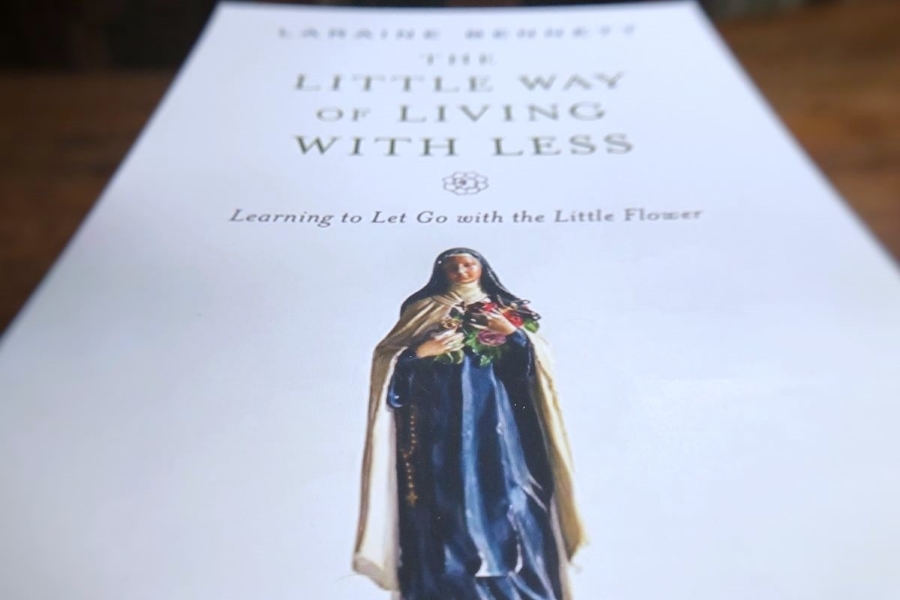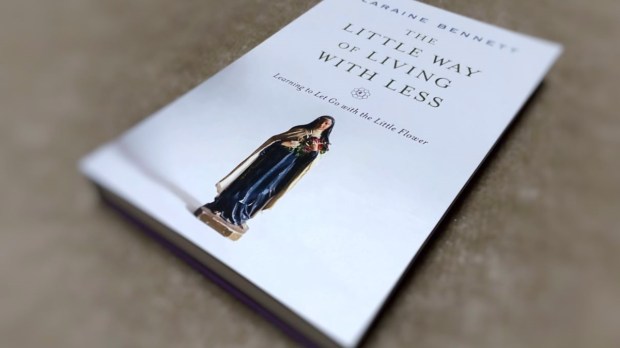Simplicity, decluttering, and minimalism are big buzzwords these days, and it turns out there’s a spiritual dimension to these popular topics.
When Catholic writer and speaker Laraine Bennett began the process of decluttering her family home for an upcoming move, she realized she was learning spiritual lessons from the process. She turned those lessons into a beautiful and inspiring book, The Little Way of Living with Less: Learning to Let Go with the Little Flower.
The Little Way of Living with Less is a spiritual journey guided by St. Therese of Lisieux toward a “less is more” manner of living. It shares one couple’s effort to downsize, declutter, and detach — and the challenge of growing in the virtues that are associated with this process. The book offers a practical antidote to the consumerism and commodification of daily home life.

I had the chance to catch up with author Laraine Bennett about her new book. Here is our conversation.
What inspired you to write this book?
The immediate motivation came a few years ago as we prepared to sell the home our family had lived in for nearly 20 years. We had raised our family in one of those typical suburban McMansions … far, far away from work (in fact an hour and a half commute each way!). Our children were now living in their own homes and raising their own families, while we were still maintaining the large 4,000 square foot home.
One day my husband, Art, said to me, “You know, Laraine, we actually live in only about 10% of this house—yet we spend a lot of time and money repairing the roof, fixing leaks, cleaning it, etc. “In fact, it’s really just a very well-decorated 4,000 square foot STORAGE UNIT for our kids’ stuff!”
The stuff they don’t actually want!
So, we began the process of getting rid of 20+ years of accumulated furniture, books and memorabilia (including my deceased parents’ things!)—donating, selling on Facebook and many, many trips to the dump—and I discovered this was really, really hard. As I painfully detached myself from years of material things steeped in memories, I wondered, “Why do things have such a hold on us?” And really, the answer is that we give them that power! They are often proxies for something else we feel we lack, whether it’s control or prestige or security or something else. It’s the ancient story of the Israelites in the desert, complaining that Moses brought them out of slavery … just to die in the desert! But God brings us all out of slavery so that we can be free! Free of things that drag us down, make us anxious, or trap us in sin.
I realized that there were virtues involved in this process of detaching! I figured, when looking to detach, downsize, or live small, who better to turn to than St. Therese? The Little Flower practiced virtues of detachment, charity, poverty of spirit, trust and gratitude, and so much more to a heroic degree.
Minimalism, decluttering and small living are popular topics these days … but what are the deeper spiritual realities? This is what I wanted to explore.
Who is the intended audience for your book?
This book is for everyone! Whether empty nesters like us are who are looking to downsize, singles on a budget who are trying to make the most of a small space, or young families (like our own adult married kids who with their own families) who are more likely to embrace minimalism and small living than those of us from the boomer generation—everyone can find something enlightening, both spiritual and practical, in this book. Think about decluttering your soul as well as your home! Each chapter focuses on a virtue, such as charity, order, simplicity, gratitude, etc. and includes practical tips from professional organizer Jacquelyn Dupuy of Interior Freedom, LLC. So, readers can immediately start putting into practice the virtues involved in decluttering and organizing. Even my husband, a life-long packrat who seems to be “clutter blind,” discovered the benefit of living with less—he enjoys how calm and peaceful our home is with less “stuff.”
How can St. Therese inspire readers to take a more detached view toward material goods?
Many people have asked me, “Why a saint who died at age 24 and spent her adult years in a tiny cell in a cloistered convent?” Yet St. Therese is not so unlike us! She was raised in a beautiful home and enjoyed the comforts of a middle-class lifestyle; her father, Louis Martin, was a successful watchmaker and her mother, Zelie, was a lacemaker. In fact, Therese very much enjoyed having beautiful objects, art, and precious things.
Yet at a very young age she was aware that material things would not bring lasting joy. During a visit at age 10 to Alencon, she notes in her autobiography that she was “surrounded with gaiety and pleasure and was entertained, pampered, and generally made much of…. I must confess that this life was not without its attractions for me.” Yet she knew even at that young age that “all is fleeting that we cherish under the sun. The only good thing is to love God with all one’s heart and to stay poor in spirit.”
St. Therese had great poverty of spirit, a very challenging spiritual reality for those of us living today in this first world country with all our material comforts! Yet, the Catechism of the Catholic Church reminds us that we are all called to poverty of spirit! St. Therese reminds us, “Joy isn’t found in the material objects surrounding us, but in the inner recess of the soul.”
Besides St. Therese, what are some of your other favorite sources of inspiration for living with detachment? I wonder if Marie Kondo was an inspiration.
Yes, Marie Kondo was an inspiration! She maintains both respect for things along with the ability to let go of them. Isn’t that what we are called to as Christians? We are not supposed to disdain the beautiful things God has given us! We are to appreciate and enjoy them and, most importantly, to be grateful to God for everything we have here on earth. Yet at the same time, we want to detach from anything that might keep us from loving God with all our heart, mind, soul and strength.
As we are pursuing the more practical aspects of detaching (such as decluttering our homes), Marie Kondo’s motto of letting go of anything that doesn’t “spark joy” is particularly helpful. In fact, Plato can explain this “joy-sparking” phenomenon: he believed that to act well, before you can begin to work toward a goal (for example, decluttering or organizing!), you need to have an image of the noble or the beautiful. Because we perceive the goal as beautiful, we embark on a virtuous task! Think about that the next time you clean out your junk drawer!
Why is this message of order and simplicity so important in today’s world?
How often are we running from task to task, distracted by social media and the busyness of life, feeling overwhelmed and anxious? What is the antidote to our anxiety and our distractions? St. Therese was a beautiful example of simplicity. “The closer one approaches to God, the simpler one becomes,” Sister Febroni told St. Therese. St. Therese was completely focused on doing God’s will and loving God at every moment, in every action, no matter how small or simple. “Jesus does not demand great actions from us but simply surrender and gratitude,” she wrote.
As we simplify our homes and our lives, we become less distracted and scattered, more integrated and focused on our most important goals: loving God and our neighbor. And creating a simple, ordered home helps us. With less stuff to distract us, we can focus more fully on what is truly important in our lives. Our homes become places of rest and peace, where everyone is welcomed and cherished. And we, too, can practice the little way of loving God and our family and friends.
What are some of your top tips for living according to this “little way” of detachment, especially for someone who is new to the idea?
Each chapter in the book has a simple spiritual lesson and a practical organizing tip. Some of the lessons are the following:
- Place your trust and confidence in God as St. Therese did.
- Ask the Holy Spirit for guidance and wisdom in knowing what things, attitudes, or creatures you need to let go of.
- Keep your heart alive to love, serve others, strengthen the bonds of love.
- Above all, be grateful.
Gratitude is the antidote to our over consumption, anxiety and envy about material things. St. Therese teaches us that gratitude is at the heart of the Little Way: Gratitude draws down God’s grace.
What is the most important thing you want to share about your book and its message of “living with less”?
As St. Therese said, “The world’s thy ship and not thy home!” Our true home is heaven, to be one with God Himself, one in unity with the source of love and peace, called to everlasting joy at the wedding feast of the lamb.
When we detach from creatures, we will find that we are living a little lighter — more free, less burdened by anxiety, with more room for love. Whether minimalists or maximalists, we all want our homes to be places of refuge, of communion, of light, refreshment and peace! Places where everyone is welcomed with generosity and hospitality, and we serve one another with joy.
But the most important message we all can learn from St. Therese and the Little Way is that for each one of us, our vocation is love. To love fully, freely, and with true joy, we need our hearts to be detached from anything that holds us back.



